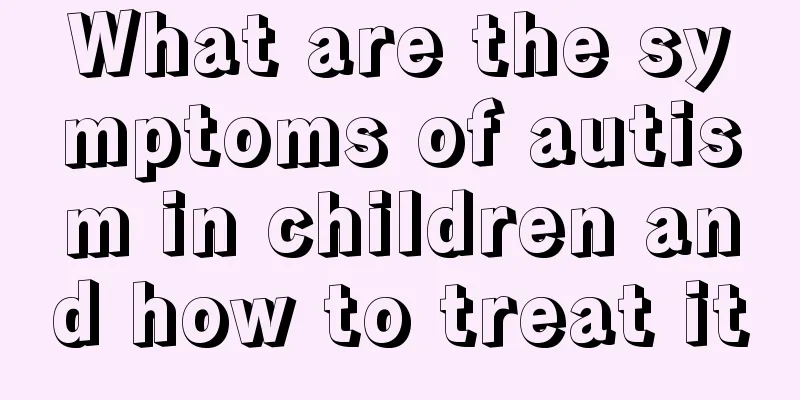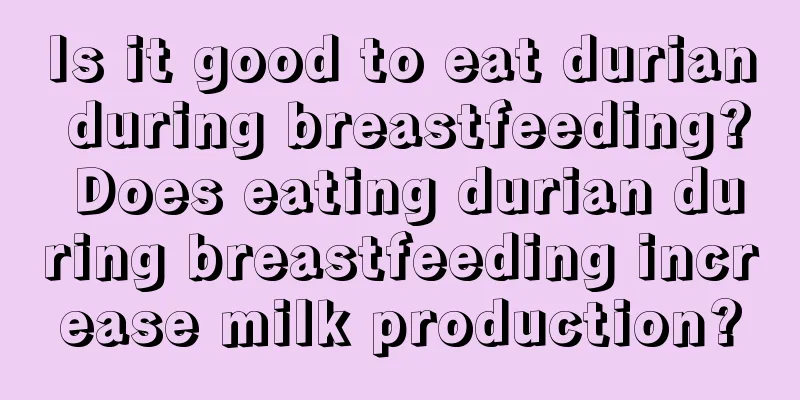Can I eat persimmons during breastfeeding? Can I eat persimmons during breastfeeding?

|
What new mothers eat during breastfeeding is always of particular concern. It should be good for the health of adults and take into account the nutritional needs of the baby. So, can you eat persimmons during breastfeeding? Is it good to eat persimmons during breastfeeding? Can I eat persimmons during breastfeeding?You can eat persimmons during breastfeeding, but you must eat them in moderation. What are the effects of eating persimmons during breastfeeding? Persimmons are rich in carbohydrates such as sucrose, fructose, and cellulose, as well as nutrients such as protein, calcium, and phosphorus. However, the astringency of persimmons is caused by tannic acid (also known as tannic acid), so it is not advisable to eat too much. Effects of eating persimmons on mothers during breastfeedingImpact on new mothers: Eating too many persimmons will cause constipation, and new mothers will feel uncomfortable. As we all know, persimmons contain tannic acid and pectin, which will coagulate when encountering stomach acid, and then combine with the shed epithelium, mucus and food residues in the stomach, especially cellulose to form persimmon stones, which will eventually lead to persimmon stone disease. Effects of eating persimmons during breastfeeding on babiesImpact on the baby: There is one item on the red and black list of lactating mothers' diet: Avoid eating raw, cold, alkaline, or acidic foods during lactation. Persimmons are hot and damp in nature. Eating too much can easily cause milk to dry up, and may cause eczema in babies, which is not good for the baby's health. Can you eat persimmons during lactation? In summary, lactating mothers can eat persimmons, but they must be eaten in moderation, generally once a day, and it is best not to eat them. Precautions for eating persimmons during lactation1. Know when to stop. The tannic acid in persimmons can form compounds with calcium, zinc, magnesium, iron and other minerals in food that cannot be absorbed by the human body. Lactating women lack these nutrients, which will indirectly affect the baby's absorption of nutrition.2. Do not eat persimmon skins or on an empty stomach. This is because most of the tannic acid in persimmons is concentrated in the skins. When the persimmons are no longer astringent, it is impossible to remove all the tannic acid. If you eat the skins together, it is more likely to form gastric persimmon stones.3. Do not eat with high-protein crabs, fish, shrimps and other foods. Lactating women will eat some high-protein foods to supplement nutrition, but high-protein crabs, fish, and shrimps are easily coagulated into blocks under the action of persimmon tannic acid, namely gastric persimmon stones.4. Rinse your mouth after eating. Persimmons are high in sugar and pectin. After eating persimmons, some of them will always remain in the mouth, especially in the gaps between teeth. Coupled with the weakly acidic tannic acid, it is easy to erode the teeth and form caries. Therefore, it is advisable to drink a few sips of water or rinse your mouth in time after eating persimmons."No. 5 Parenting" (:yuer5h) |
<<: How to start developing your baby's cognitive abilities
>>: What talents are better for children to learn? 6 suggestions from doctors
Recommend
What should I do if my grades are not good? Will people with poor grades have no future?
Poor grades are a concern for every student study...
Why are children always sick? 3 things that harm their health
The first thing is to often eat a lot of meat and...
What should I do if my baby is always angry? Mothers should be patient and comfort them.
As children grow older, their emotional expressio...
What are educational toys? Ten toys to stimulate your baby's social skills
Choosing toys for babies is a brain-burning choic...
What to do with postpartum hemorrhoids? How to treat postpartum hemorrhoids
Hemorrhoids are a very uncomfortable disease. Man...
How to heat breast milk must be done correctly
Breast milk can be heated, but the heating method...
How to arrange sex life to get pregnant better?
Young couples who are preparing for pregnancy mus...
Will a small uterus affect infertility?
A small uterus is one of the serious gynecologica...
Does Crest toothpaste come in a tin foil seal? How can you tell if Crest toothpaste is real or fake?
I bought a tube of Crest toothpaste and found it ...
How many days does it take for a newborn to be one month old? ...
After a baby is born, people often ask if it is o...
What are the harms to children's health if they drink cola frequently?
Some mothers are busy and often let their childre...
Can I lose weight by breastfeeding? Can I lose weight by breastfeeding?
Will breastfeeding make you thinner? Today, I wil...
Is the Comotomo pacifier good to use? How about the Comotomo pacifier?
There are four types of comotomo pacifiers, which...
How to prevent babies from getting sick? How to prevent babies from getting infected with diseases?
Many babies have weak body resistance, which requ...
Why am I still constipated after taking the heat-clearing medicine? To clear the heat, you need to find out the cause before taking the medicine
In the eyes of many parents, children's exces...









